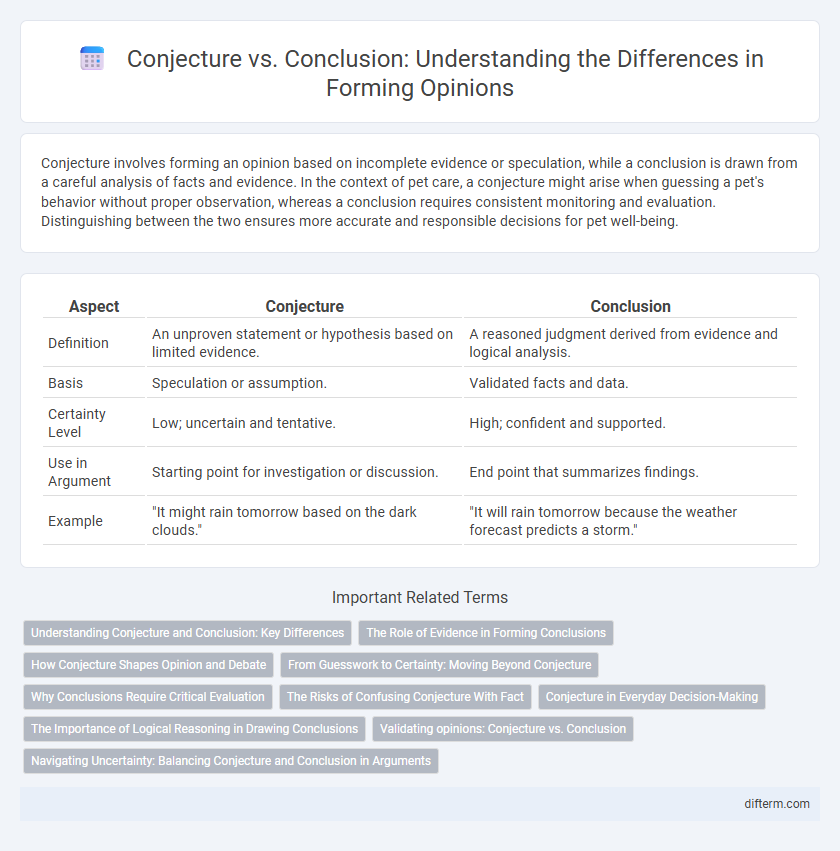Conjecture involves forming an opinion based on incomplete evidence or speculation, while a conclusion is drawn from a careful analysis of facts and evidence. In the context of pet care, a conjecture might arise when guessing a pet's behavior without proper observation, whereas a conclusion requires consistent monitoring and evaluation. Distinguishing between the two ensures more accurate and responsible decisions for pet well-being.
Table of Comparison
| Aspect | Conjecture | Conclusion |
|---|---|---|
| Definition | An unproven statement or hypothesis based on limited evidence. | A reasoned judgment derived from evidence and logical analysis. |
| Basis | Speculation or assumption. | Validated facts and data. |
| Certainty Level | Low; uncertain and tentative. | High; confident and supported. |
| Use in Argument | Starting point for investigation or discussion. | End point that summarizes findings. |
| Example | "It might rain tomorrow based on the dark clouds." | "It will rain tomorrow because the weather forecast predicts a storm." |
Understanding Conjecture and Conclusion: Key Differences
Conjecture represents a hypothesis based on limited evidence, often requiring further investigation to validate its accuracy. Conclusion is the definitive judgment reached after analyzing and interpreting sufficient data, reflecting a well-supported answer. Understanding the distinctions between conjecture and conclusion enhances critical thinking by clarifying the degree of certainty and evidence involved in reasoning.
The Role of Evidence in Forming Conclusions
Evidence serves as the cornerstone in transitioning from conjecture to conclusion, providing the necessary support to validate or refute initial hypotheses. Without empirical data or verified facts, conjectures remain speculative and lack reliability. Rigorous analysis and corroboration ensure conclusions are grounded in truth rather than assumption.
How Conjecture Shapes Opinion and Debate
Conjecture plays a crucial role in shaping opinion by introducing hypotheses that prompt critical thinking and exploration beyond established facts. It stimulates debate by encouraging diverse perspectives and challenging existing conclusions, fostering a dynamic environment for intellectual discourse. The interplay between conjecture and conclusion drives the evolution of ideas, allowing opinions to adapt and refine through continuous questioning and evidence evaluation.
From Guesswork to Certainty: Moving Beyond Conjecture
Conjecture represents an initial hypothesis based on incomplete evidence, often relying on guesswork rather than verified facts. Conclusion emerges only after critical analysis and sufficient data support that transforms speculation into reasoned certainty. Moving beyond conjecture requires rigorous validation processes and empirical testing to ensure reliable and definitive outcomes.
Why Conclusions Require Critical Evaluation
Conclusions require critical evaluation because they are definitive statements drawn from data that may contain biases or incomplete information. Unlike conjectures, which are tentative guesses open to revision, conclusions claim certainty and influence decision-making processes, making accuracy essential. Evaluating conclusions rigorously helps prevent errors and supports sound reasoning in academic, scientific, and everyday contexts.
The Risks of Confusing Conjecture With Fact
Confusing conjecture with fact can lead to significant misinformation, as conjectures are unproven hypotheses while conclusions are supported by evidence. This misinterpretation risks flawed decision-making in scientific research, legal judgments, and policy development. Recognizing the distinction ensures critical thinking and preserves the integrity of knowledge dissemination.
Conjecture in Everyday Decision-Making
Conjecture plays a crucial role in everyday decision-making by allowing individuals to form hypotheses based on incomplete information, enabling quicker responses in uncertain situations. Unlike definitive conclusions, conjectures offer flexible frameworks that accommodate new data and evolving circumstances. This provisional nature supports adaptive thinking and problem-solving in dynamic environments such as personal finance, health choices, and social interactions.
The Importance of Logical Reasoning in Drawing Conclusions
Logical reasoning serves as the foundation for distinguishing conjectures from conclusions, ensuring that inferences are based on evidence rather than speculation. Accurate conclusions rely on the systematic evaluation of premises, reducing cognitive biases and errors in judgment. Mastery of logical reasoning strengthens critical thinking, enabling individuals to validate claims with clarity and precision.
Validating opinions: Conjecture vs. Conclusion
Validating opinions requires distinguishing between conjecture and conclusion by assessing the evidence's strength and reliability. While conjectures are speculative ideas based on limited information, conclusions are definitive judgments drawn from comprehensive analysis and verified data. Effective opinion validation depends on rigorous evaluation of facts to move beyond conjecture toward well-supported conclusions.
Navigating Uncertainty: Balancing Conjecture and Conclusion in Arguments
Balancing conjecture and conclusion is essential in navigating uncertainty within arguments, as conjecture invites exploration while conclusion demands definitive judgment. Effective reasoning incorporates provisional hypotheses that guide inquiry without prematurely closing off alternative explanations or evidence. Mastery lies in recognizing when to suspend conclusion in favor of adaptive conjecture, ensuring arguments remain dynamic and responsive to emerging data.
Conjecture vs Conclusion Infographic

 difterm.com
difterm.com